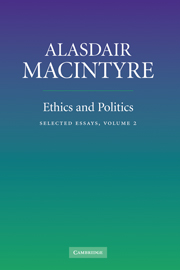Book contents
- Frontmatter
- Contents
- Preface
- Acknowledgments
- PART I LEARNING FROM ARISTOTLE AND AQUINAS
- 1 Rival Aristotles: Aristotle against some Renaissance Aristotelians
- 2 Rival Aristotles: Aristotle against some modern Aristotelians
- 3 Natural law as subversive: the case of Aquinas
- 4 Aquinas and the extent of moral disagreement
- PART II ETHICS
- PART III THE POLITICS OF ETHICS
- Index
4 - Aquinas and the extent of moral disagreement
Published online by Cambridge University Press: 27 January 2010
- Frontmatter
- Contents
- Preface
- Acknowledgments
- PART I LEARNING FROM ARISTOTLE AND AQUINAS
- 1 Rival Aristotles: Aristotle against some Renaissance Aristotelians
- 2 Rival Aristotles: Aristotle against some modern Aristotelians
- 3 Natural law as subversive: the case of Aquinas
- 4 Aquinas and the extent of moral disagreement
- PART II ETHICS
- PART III THE POLITICS OF ETHICS
- Index
Summary
I shall ask two questions in this essay: what kind of difficulties do the facts of moral disagreement pose for Aquinas's account of the natural law? And, if those difficulties can be met, what are the implications for our understanding of moral disagreement? I begin therefore first by setting out Aquinas's account of the natural law, to some degree expanding it, and next by cataloguing what I take to be the incontrovertible facts of moral disagreement.
The first principles, the fundamental precepts, of the natural law, on Aquinas's view, all give expression to the first principle of practical reason: that good is to be done and pursued and evil is to avoided. The goods that we as human beings have it in us to pursue are of three kinds: the good of our physical nature, the good, that is, of preserving our lives and health from those dangers that threaten our continuing existence; the goods that belong to our animal nature, including the good of sexuality and the goods of educating and caring for our children; and the goods that belong to our nature as rational animals, the goods of knowledge, both of nature and of God, and the goods of a social life informed by the precepts of reason (Summa Theologiae Ia-IIae 94, 2).
There are therefore several distinct precepts of the natural law, each a precept of reason directed to our common good that enjoins the achievement of one or more of these shared human goods or forbids what endangers that achievement.
- Type
- Chapter
- Information
- Ethics and PoliticsSelected Essays, pp. 64 - 82Publisher: Cambridge University PressPrint publication year: 2006
- 5
- Cited by



